If your lemon juice looks dark or cloudy, smells off, has visible mold, or tastes bitter, it's likely gone bad. Freshly squeezed lemon juice lasts only 3 to 4 days in the fridge, while commercial varieties can last up to 12 months once opened. Exposure to air speeds up spoilage, so store it in an airtight container. Want to know more about maximizing freshness and avoiding risks? There's plenty more to discover!
Key Takeaways
- Check for a dark or cloudy appearance, which may indicate spoilage in the lemon juice.
- An off smell is a strong sign that the juice has gone bad.
- Visible mold is a clear indicator that the lemon juice should be discarded immediately.
- A bitter taste or lack of citrus flavor suggests the juice has spoiled.
- If the juice has changed consistency or has sediment, it's likely no longer fresh.
Does Lemon Juice Go Bad?
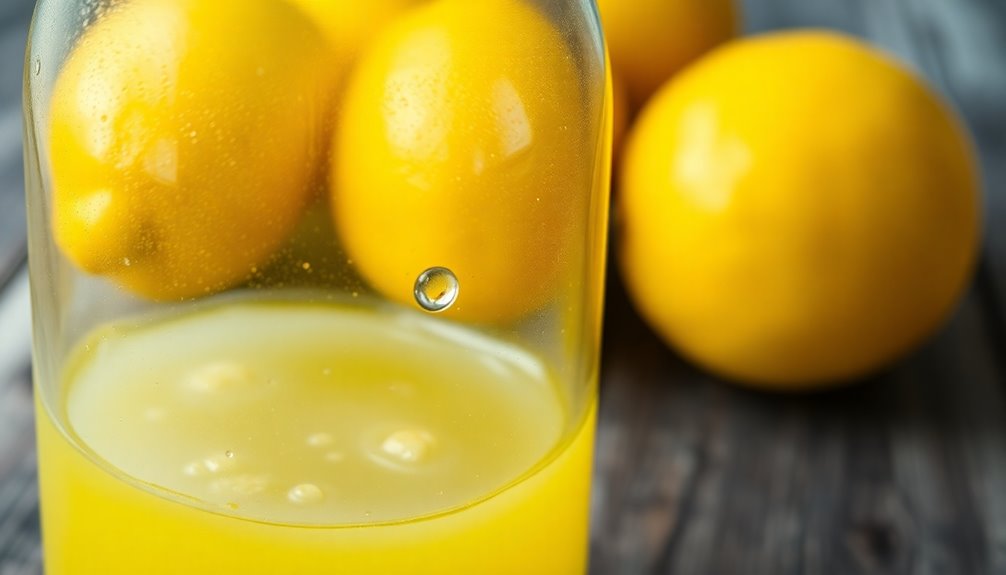
While you might think lemon juice lasts forever due to its acidity, it can actually go bad over time. Freshly squeezed lemon juice typically lasts just 3 to 4 days when stored in the refrigerator.
In contrast, commercial lemon juice can last between 3 to 12 months, depending on how it's stored. Spoilage occurs when lemon juice is exposed to air and microorganisms, leading to yeast, mold, or bacteria growth.
Look for signs of spoilage, like off-tastes, unpleasant odors, or discoloration such as cloudiness or darkening. Consuming spoiled lemon juice poses health risks, including food poisoning with symptoms like nausea and diarrhea.
If you suspect your lemon juice has gone bad, it's best to discard it to avoid any potential issues.
How Long Does Lemon Juice Last?

Lemon juice has varying shelf lives depending on its form and storage conditions.
Freshly squeezed lemon juice typically lasts 3 to 4 days in the refrigerator when stored in an airtight container, so you should discard freshly squeezed juice after this period.
Store-bought lemon juice in an unopened bottle can last anywhere from 3 to 12 months, while refrigerated bottled lemon juice remains fresh for up to 12 months once opened, though it's best consumed within a few months for ideal quality.
If you leave fresh lemon juice at room temperature, it can go bad in just one day.
For longer storage, freezing lemon juice in ice cube trays allows it to last up to 6 months with proper storage, preserving its flavor and acidity.
Signs That Lemon Juice Has Gone Bad
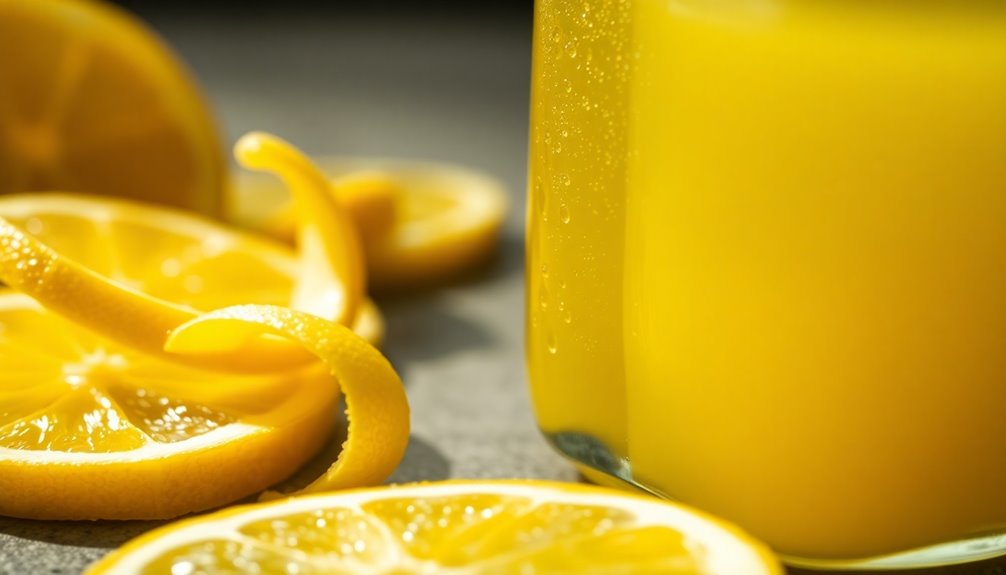
After understanding how long lemon juice lasts, it's important to recognize the signs that it has gone bad. Keep an eye out for the following:
- Dark or Cloudy Appearance: Fresh lemon juice should have a light yellow color. If it looks dark or cloudy, it may be spoiled.
- Off Smell: A musty or off smell indicates spoilage; fresh juice should have a bright citrus scent.
- Visible Mold: If you spot any mold, discard it immediately, as it's no longer safe to consume.
- Consistency Changes: Regularly check for unusual changes in consistency or sediment, as these can signal spoilage.
Additionally, taste testing is essential—if it tastes bitter or lacks citrus flavor, it's best to throw it out.
What Makes Lemon Juice Spoil?
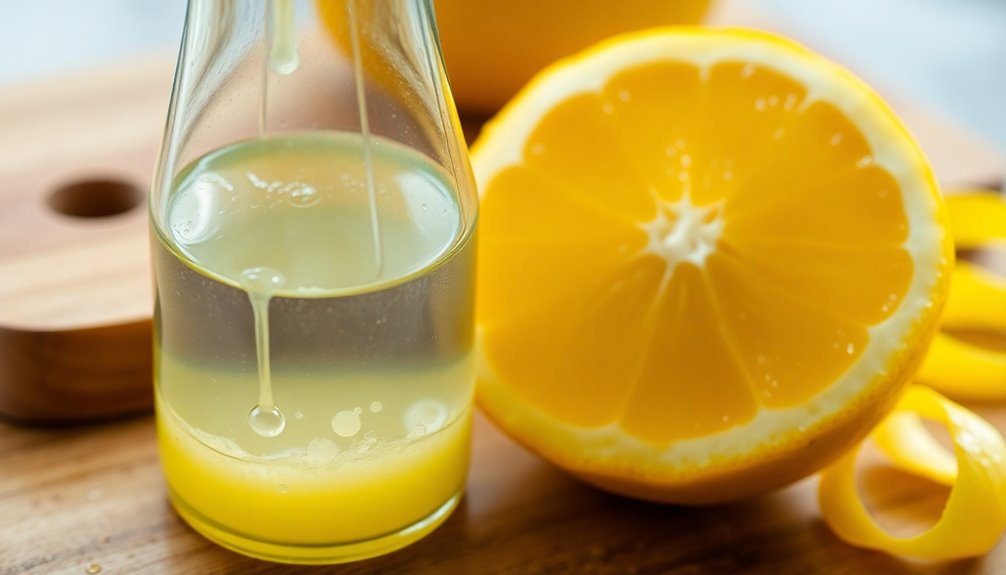
Lemon juice spoils mainly due to exposure to air and the growth of microorganisms.
Even though it's acidic, the high water content creates a perfect environment for bacteria and mold to thrive.
Air Exposure Effects
When you open a container of lemon juice, exposure to air considerably increases the risk of spoilage.
Here's how air exposure affects your lemon juice:
- Oxidation: Oxygen leads to color changes, making the juice darker and cloudier.
- Microorganisms: Air introduces contaminants, encouraging the growth of yeast, mold, and bacteria.
- Degradation: Air exposure can diminish citric acid and other natural preservatives, speeding up spoilage.
- Freshness Loss: Without proper storage in airtight containers, your lemon juice won't retain its quality for long.
To keep your lemon juice fresh, always seal it tightly and store it away from air.
This simple step can help maintain its flavor and effectiveness for longer periods.
Microbial Growth Factors
Once you've opened a container of lemon juice, spoilage can set in quickly due to various factors that promote microbial growth.
Fresh squeezed lemon juice lasts a shorter time compared to properly canned lemon juice, as it lacks preservatives. The high water content creates an ideal environment for yeast, mold, and bacteria, leading to spoilage and pathogenic microorganisms. To extend its shelf life, fresh squeezed lemon juice can be refrigerated and should be consumed within a few days. In contrast, canned lemon juice, containing preservatives and a lower water activity level, can last for months or even years when stored properly. Understanding the juice definition and surprising facts about the differences in preservation methods can help consumers make informed choices about how to store and use lemon juice effectively.
Although the acidic environment of lemon juice initially inhibits some growth, it won't prevent spoilage indefinitely as antioxidants degrade.
To extend freshness, verify your juice is stored in an airtight container and refrigerated.
Risks of Consuming Spoiled Lemon Juice
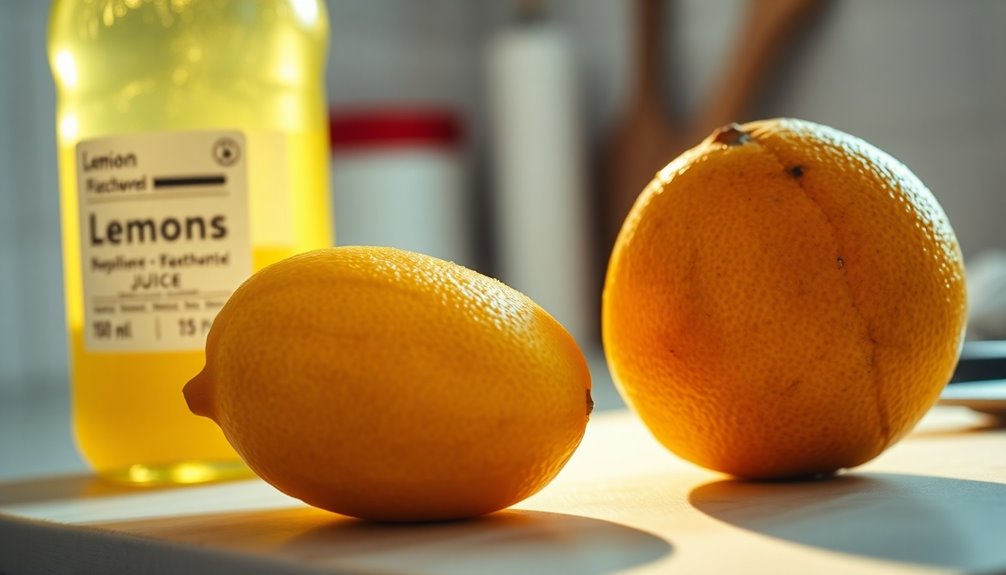
Spoiled lemon juice poses significant health risks that shouldn't be ignored. When consuming spoiled lemon juice, you might encounter:
- Food poisoning due to harmful microorganisms.
- Signs of spoilage like unusual odors, discoloration, and off-tastes.
- Symptoms such as chills, nausea, diarrhea, vomiting, and abdominal pain.
- Increased contamination risk after the container's been exposed to air.
These health risks can emerge within hours or up to two days after ingestion.
If you experience severe or prolonged symptoms, it's essential to seek medical attention.
Don't take chances with your health—always check for signs of spoilage before using lemon juice.
Prioritizing your safety will help you avoid unpleasant and potentially dangerous outcomes from consuming spoiled lemon.
Tips to Maximize the Shelf Life of Lemon Juice
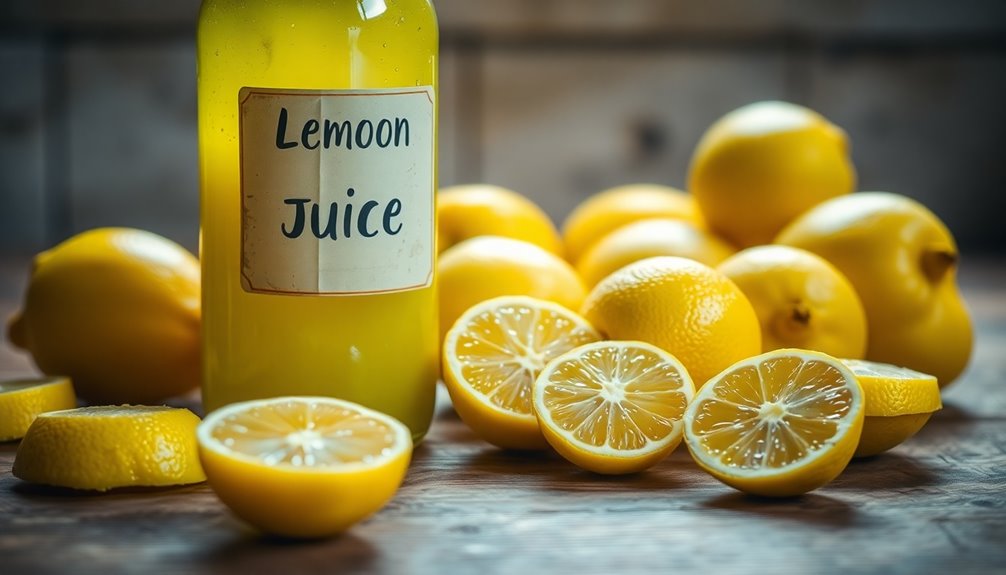
To keep your lemon juice fresh for as long as possible, it's essential to store it properly. Always use an airtight container, preferably glass, to minimize exposure to air.
Freshly squeezed lemon juice should be refrigerated, where it'll last about 3-4 days, while unopened commercial lemon juice can have a shelf life of 3-12 months.
If you have excess juice, consider freezing it in ice cube trays; this way, it can last up to six months without losing flavor.
Be cautious—if you leave lemon juice at room temperature, use it within a day to prevent spoilage.
Finally, label your containers with the storage date to easily track freshness and avoid using spoiled lemon juice.
Frequently Asked Questions
How to Know When Lemon Juice Is Bad?
To know when your lemon juice is bad, look for signs like mold or cloudiness.
Fresh juice should be light yellow; if it's darker or murky, it's time to toss it.
Trust your nose—an off or musty smell means it's no longer good.
Finally, taste a small amount; if it's lost its citrusy flavor and tastes bitter, discard it.
Always prioritize safety and throw it away if you see any spoilage.
How to Know if Lemon Is Spoiled?
Imagine biting into a lemon expecting a burst of tangy goodness, only to be met with a bitter disappointment.
To know if your lemon's spoiled, check for signs like a dull color or any mold. If it smells musty instead of fresh, toss it.
A taste test can also reveal its fate—if it’s off, don’t hesitate. Always trust your instincts; when in doubt, it’s safer to discard it. Additionally, it’s essential to keep an eye on expiry dates and storage conditions, as these can greatly affect the quality and safety of a drink. Many people often overlook these factors, especially when it comes to some of the best selling American beverages. By being vigilant and attentive to your senses, you can ensure that you enjoy only the freshest and most delicious options available.
Fresh lemons should always brighten your day!
What Will Happen if You Drink Expired Lemon Juice?
If you drink expired lemon juice, you might experience food poisoning symptoms like chills, nausea, diarrhea, and vomiting.
Spoiled lemon juice can harbor harmful microorganisms, which could irritate your digestive system. You'll notice signs like off-smells, unusual colors, or a bitter taste before consuming it.
If you feel severe or prolonged symptoms afterward, don't wait—seek medical attention promptly to avoid dehydration and other complications.
Stay safe and check your lemon juice!
How Long Is Bottled Lemon Juice Good For?
Picture a revitalizing glass of lemonade on a hot day.
Bottled lemon juice can be your best friend, staying good for 3 to 12 months when unopened, depending on the brand.
Once you crack it open, it should go in the fridge, where it'll last around 3 to 6 months for the best taste.
If you seal it tightly, you might even get up to a year of freshness from it.
Conclusion
In the bright, zesty world of lemon juice, freshness is key. If your lemon juice starts to lose its vibrant color or develops an off smell, toss it out like a wilted flower. Remember, a sip of spoiled juice can turn your invigorating drink into a sour surprise. To keep your lemon juice as lively as a sunlit kitchen, store it properly and savor the tangy goodness. Your taste buds will thank you for it!
Cindy thoroughly researches juicing trends, techniques, and recipes to provide readers with practical advice and inspiration. Her writing style is accessible, engaging, and designed to make complex concepts easy to understand. Cindy’s dedication to promoting the advantages of juicing shines through her work, empowering readers to make positive changes in their lives through the simple act of juicing.











